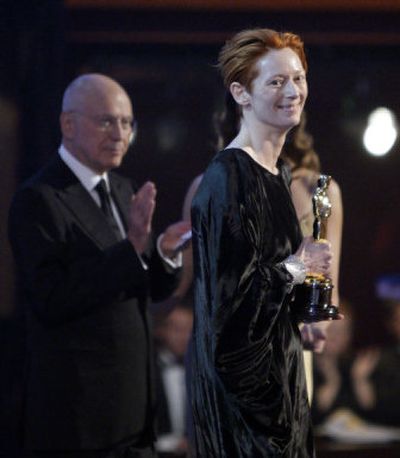Academy honors Coens

LOS ANGELES – The Coen brothers completed their journey from the fringes to Hollywood’s mainstream Sunday, their crime saga “No Country for Old Men” winning four Academy Awards, including best picture, in a ceremony that also featured a strong international flavor.
Javier Bardem won for supporting actor in “No Country,” which earned Joel and Ethan Coen best director, best adapted screenplay and the best-picture honor as producers.
Accepting the directing honor alongside his brother, Joel Coen said they’d been making films since childhood.
“What we do now doesn’t feel that much different from what we were doing then,” Joel Coen said. “We’re very thankful to all of you out there for continuing to let us play in our corner of the sandbox.”
Daniel Day-Lewis won his second best-actor Academy Award for the oil-boom epic “There Will Be Blood,” while “La Vie En Rose” star Marion Cotillard was a surprise winner for best actress over Julie Christie, who had been expected to win for “Away From Her.”
All four acting prizes went to Europeans: Frenchwoman Cotillard, Spaniard Bardem, and Brits Day-Lewis and Tilda Swinton, the supporting-actress winner for “Michael Clayton.”
As a conniving, acquisitive petroleum pioneer caught up in California’s oil boom of the early 20th century, Day-Lewis won for a part that could scarcely have been more different from his understated role as a writer with cerebral palsy in 1989’s “My Left Foot.”
“My deepest thanks to the academy for whacking me with the handsomest bludgeon in town,” Day-Lewis said.
The Coens missed a chance to make Oscar history – four wins for a single film – when they lost the editing prize, for which they were nominated under the pseudonym Roderick Jaynes.
“The Bourne Ultimatum” won the editing Oscar and swept all three categories in which it was nominated, including sound editing and sound mixing.
Past winners for their screenplay for 1996’s “Fargo,” Joel and Ethan Coen joined an elite list of filmmakers to win three Oscars in a single night, including Francis Ford Coppola (“The Godfather Part II”), James Cameron (“Titanic”) and Billy Wilder (“The Apartment”).
Cotillard, the first winner ever for a French-language performance, tearfully thanked her director, Olivier Dahan.
“Maestro Olivier, you rocked my life,” said Cotillard, a French beauty who is a dynamo as Piaf, playing the warbling chanteuse through three decades, from raw late teens as a singer rising from the gutter through international stardom and her final days in her frail 40s.
A relatively fresh face in Hollywood, Cotillard has U.S. credits that include “Big Fish,” “A Good Year” and the upcoming “Public Enemies,” featuring Johnny Depp and Christian Bale.
With a heartbreaking turn as a woman succumbing to Alzheimer’s in “Away From Her,” Christie had been expected to win her second Oscar. She won best actress 42 years ago for “Darling.”
Heavies ruled the first acting prizes. Along with Day-Lewis’ greedy oilman, Bardem played an unshakable executioner in “No Country,” and Swinton played a malevolent attorney in “Michael Clayton.”
“I have an American agent who is the spitting image of this,” said Swinton, fondly looking at her Oscar statuette.
“Really, truly, the same shape head, and it has to be said, the buttocks. And I’m giving this to him, because there’s no way I’d be in America at all, ever, on a plane if it wasn’t for him,” said Swinton.
Bardem won for his fearsome turn in “No Country.”
“Thank you to the Coens for being crazy enough to think I could do that and for putting one of the most horrible haircuts in history over my head,” said Bardem.
Mickey Mouse gained a rival as Hollywood’s favorite rodent as the rat tale “Ratatouille” was named best animated film, the second Oscar win in the category for director Brad Bird.
Bird thanked his junior-high guidance counselor, who expressed repeated skepticism over his desire to become a filmmaker.
“It went on like this until we were sick of each other,” said Bird, who also won the animation Oscar for 2004’s “The Incredibles” and shared a nomination for original screenplay for “Ratatouille,” a $200 million blockbuster. “I only realized just recently that he gave me the perfect training for the movie business.”
Glen Hansard of the Irish band The Frames and Marketa Irglova, both non-actors who starred in the romance “Once,” won the best-song Oscar for “Falling Slowly,” one of several tunes they wrote for the film.
“What are we doing here? This is mad,” Hansard said, recounting the low-budget history of “Once.” “It took us three weeks to make. We made it for a hundred grand. We never thought we’d come into a room like this and be in front of all you people.”
Michael Moore, who assailed President Bush over the Iraq war in his Oscar speech for documentary winner “Bowling for Columbine” five years ago, missed out on a chance to take the podium again.
His health-care study “Sicko” lost the documentary prize to “Taxi to the Dark Side,” a war-on-terror chronicle that centers on an innocent Afghan cab driver killed in detention.
Box-office dud “The Golden Compass” scored an upset for visual effects over the blockbusters “Transformers” and “Pirates of the Caribbean: At World’s End.”
Other early winners included “Elizabeth: The Golden Age” for costume design, “La Vie En Rose” for makeup and “Sweeney Todd: The Demon Barber of Fleet Street” for art direction.